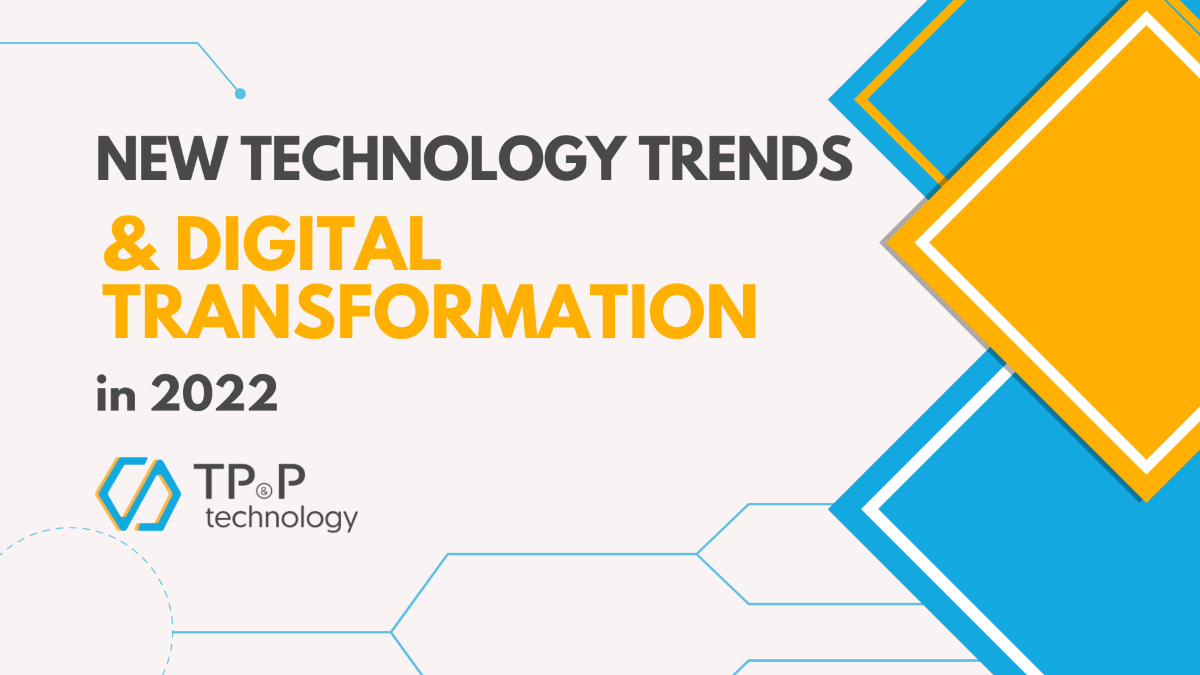
New Technology Trends & Digital Transformation in 2022
Currently, business organizations have more opportunities than ever to explore many of the innovations which are brought about through the arrival of digital transformation. During the pandemic outbreak, companies have witnessed the necessity of adapting or accelerating the adoption of new technologies. In such a context, business organizations that are still operating on obsolete business models instead of embracing new technologies will be vulnerable to the risks of being left behind.
In this rapidly ever-changing business landscape, if enterprises want to remain competitive, their business strategies must be agile and capable of quickly adapting to new changes. Besides, they must also embrace changes that can have significant impacts on customer experience.
Generally speaking, to remain competitive, companies need to keep up with the newest trends in digital transformation.
Predicting what will change and what will disappear is surely not an easy task, however, it seems like there are some specific trends that will likely shape the future of digital transformation such as artificial intelligence (AI) and machine learning (ML), and cloud-based platforms.
These trends are already having an impact on the interaction between businesses and their customers, and even other businesses. This article will examine the five most exciting trends in digital transformation that can shape the future of business and how they can help your company thrive in 2022.
The Top Five 2022 Technology Trends That Affect Digital Transformation
Cloud computing has changed how companies operate, providing access to worldwide data to business employees in any place, at any time. With the benefits which come from Cloud technology, employees will be able to work more productively anywhere. Moreover, they are allowed to collaborate on team projects without having to travel or spend money on physical infrastructure. It is also worth mentioning that businesses can leverage Cloud technology to store huge amounts of data and consume resources in a secure way based on flexible pricing models instead of having to invest a huge sum upfront like before.
2. Large-scale investment in AI and machine learning: Using AI-powered software will be expected to become increasingly popular in various industries in the future. For example, as marketing tools and retail sales begin to take advantage of Machine Learning and AI, there is an increase in the number of marketers using these technologies as a part of a digital transformation strategy. Top sales and marketers believe that AI can save their valuable time more effectively.As companies want to improve their business' efficiency, it is expected of them to leverage AI & ML to generate insights and make data-driven decisions to improve their businesses as a whole. In a 2021/2022 survey by Baker Mckenzie, in 2020, only 14% of survey respondents were heavily investing in AI. Today, nearly half of business leaders believe that AI is primary to digital transformation [1].
3. Combination of remote work and in-person work (the hybrid work model): In order to compete with other businesses in this changing era, each company needs to stay flexible and agile. During the pandemic outbreak, there was a shift in the way employees work. The concept of a hybrid workforce - wherein employees can work from home or the office as they wish - is on the way up. According to an article by weforum.org, the hybrid working model is being considered an effective solution and way to prevent issues like digital burnout [2]. This does not come as a surprise at all since the hybrid work model lets employees work at their most productive hours, whether it be morning, afternoon, or even late at night.4. Data Protection & Cybersecurity: Giving out personal information is one of the serious issues in this current 'digital economy'. Not only are your residential addresses, emails, and bank/credit card details considered personal information, but also your behavioral patterns that are derived from data analytics. In such a context, digital consumers are all concerned about their privacy and the protection of their own privacy.
Thus, it is time for companies to consider other important aspects like how they handle the data and keep it private when it comes to advanced analytics. Consumers are not the only ones who can benefit from transparent privacy policies. With transparency, businesses can be honest about their practices. For example, the Apple iPhone privacy changes enable users to accept whether an App can track their data or not. This can lead to an increase in customer trust and loyalty since they will feel more informed and place trust in organizations with careful handling of their data.
5. Blockchain: To this date, Blockchain technology is most closely aligned with cryptocurrencies, such as Bitcoin and Ethereum. Nonetheless, there are many other ways to leverage Blockchain technology, especially in business. Applying Blockchain technology basically guarantees that transparency and security are going to be improved through its immutability. Moreover, this technology also has strong potential for companies to handle supply chains, collaborate with their partners, and manage transactions and contracts.The past year has seen an explosion of non-fungible tokens (NFTs) — they are digital intangible products that can be traded like other asset classes. Today, when NFTs is mentioned, people usually think of digital art.
Planning for a successful digital transformation project:
Successful digital transformation is achieved, first and foremost, through technology. However, implementing a successful transformation is not that easy. In order to achieve success in a digital transformation project, you need to equip the right personnel and processes in place. Here is what successful companies in achieving digital transformation have in common:
- A clear goal: The majority of companies that achieve digital transformation success have a clear vision of their long-term (3-5 years) goals and a focused roadmap on how to get there.
- Team Collaboration: Digital transformation is a team effort. Successful enterprises usually have the ability to effectively connect their people, processes, and data that can collectively facilitate transformation.
- Great customer experience: The customer experience in today's digital economy is a huge competitive edge.
- Agility: When business organizations continue to grow, companies will need to invest in technology that can help them run their operation faster, in order to keep up with the changing pace. Leveraging the right tools can help organizations to automate various rules-based, repetitive manual processes, reduce the cycle of sales, and deliver products faster than competitors.
- Technological innovation: Every successful company will put a strong culture of innovation at the heart of their business. In this rapidly ever-changing world, businesses are required to constantly find ways and solutions to distinguish themselves from other companies while evolving to meet the needs of the complex market.
To sum up:
Like technology, digital transformation also constantly evolves. It is necessary not only for big enterprises but also for small businesses to stay ahead of the curve by thinking fast and adapting to rapid changes in order to keep up with the intense competition and expand their business. Success will always find a way to come to those businesses that are one step ahead.
This is a new, and appealing business world where changes bring opportunities for businesses. Opportunities will come to those businesses that can embrace the challenges of digital transformation instead of being feared and stepping back from the trend.
References:
1. 2021/2022 Digital Transformation & Cloud Survey: A Wave of Change (bakermckenzie.com)
2. https://www.weforum.org/agenda/2021/11/productivity-hybrid-model-workforce-the-future-of-work/



